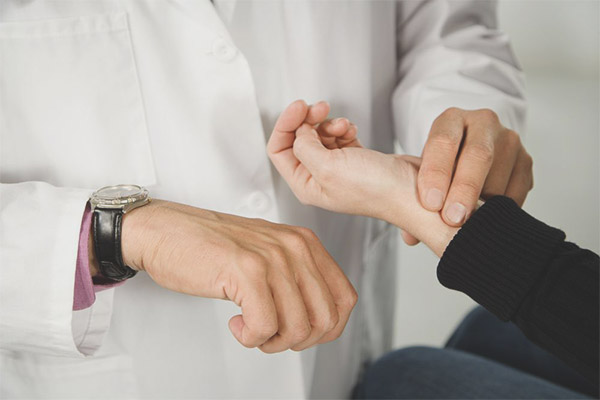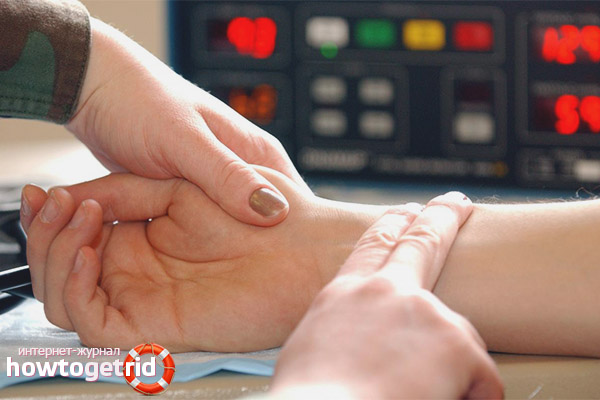The content of the article
Not every one of us has a medical education, but everyone should know the basic features of the human body. Check the work of the heart and in general, the presence of life in the body can be on the pulse. Pulse is a fluctuation of the circulatory artery, which coincides with the work of the heart muscle. By pulse, you can judge how the heart works. To measure the pulse is not difficult, you need to tightly put your fingers to the wrist and find a pulsating artery that is just above the thumb. If the pulse is rhythmic, then note 30 seconds, during which count the number of vibrations. Then the resulting number is multiplied by two. If the pulse is uneven, consider the number of heartbeats per minute. Pulse - the value is not fixed, for one person it can change hundreds of times per day.The normal pulse rate of a healthy person is 60-80 beats per minute. But many factors can affect heart rate.
What determines the pulse of a healthy person?
Measuring the pulse, you need to know about many features that can affect its frequency. We are talking about the physiological changes in the heart rate, without pathologies of the heart.
- Physical activity. Most often, the pulse increases during exercise, when the body's need for oxygen increases. Even a slight rise of several floors raises the pulse of a person, especially an unprepared person.
- Emotions. Heartbeat is very sensitive to any emotional changes in the body. Fright, fear, joy, anxiety, anxiety - all this can lead to an increase in pulse rate. One well-known cardiologist said that in his youth he could not diagnose a healthy young guy, whose heartbeat periodically increased, otherwise all indications were normal. It turned out that it was a simple love. When the nurse entered the doctor's office, the boy's heart was working twice as fast as she left, her heart calmed down.
- Sleep. When the body is sleeping, it consumes a minimum of calories, energy consumption is greatly reduced, the pulse slows down. Even a simple lying position results in a slower heart rate. And the pulse depends on the time of day - after lunch it becomes maximum.
- Floor. The pulse of a woman is physiologically greater than that of a man.
- Nutrition. The body spends a lot of calories on digesting food, the digestion process causes the pulse to accelerate, which means that after a meal, the heart rate increases, especially after a heavy and fatty meal. In addition, after the consumption of strong tea, coffee and energy drinks, the pulse is also accelerated.
- Age. The younger the child, the faster his pulse. Healthy newborn babies in a calm state have an average heart rate of 140 beats per minute. Before the year, the figure drops to 132 beats. A child of 5-6 years old has an average of 100 beats per minute, a 10-year-old child has 85 beats, adolescents - 75, etc. Remember that we are talking about the average rate, the upper and lower limits of the norm can vary by 20 strokes in both directions.
- Medication. Taking certain drugs may affect your heart rate. Among them are drugs for the heart, neuroleptics, sedatives, etc.
The pulse rate depends on the general condition of the body. If a person is in pain, his heart rate rises. At high temperatures, the heart rate rises by 10 units at each “extra” degree. Pulse can increase after sex or massage, as well as if you are in a hot and stuffy room. Cardiologists who take into account external influences on the body are aware of all these factors. But if a person is completely healthy and calm, his pulse can be increased or decreased, this indicates a serious disturbance in the body.
Causes of increased heart rate
The frequency of the maximum permissible human pulse is determined as 220- (age). If you are 30 years old, then the maximum allowable heart rate is 190 beats per minute. But this suggests an excessively high load, at the limit of possibilities. As a rule, when the exercise is stopped, the pulse of a healthy person returns to normal within 5 minutes. What could be the causes of increased heart rate without physical and emotional stress?
- If a person’s pulse is above 90 beats per minute at rest, one can talk about tachycardia, which most often indicates various changes in the work of the cardiovascular system.
- Sometimes an increase in the pulse may indicate lesions in the work of the nervous system.
- Endocrine disorders, and in particular the increased activity of the thyroid gland can cause an increase in heart rate.
- The pulse can increase in the presence of infectious diseases, malignant and benign tumors in the body, with dehydration and vomiting.
- In women, the pulse rises during pregnancy, menopause, during menstrual bleeding, with anemia.
With an increased pulse, which retains its values for a long time, it is necessary to consult a cardiologist. Especially if it is accompanied by dizziness, shortness of breath, chest pain, darkening of the eyes or loss of consciousness.
Causes of low heart rate
Since ancient times, the pulse was considered one of the main indicators of human health. In the Eastern School of Pulse Diagnostics, there is a legend about the famous doctor Bian-Qiao, who was assigned to treat the daughter of one very noble person. The complexity of the diagnosis was that the girl could not be touched, she could not be looked at. The doctor instructed to tie a thread to the girl's wrist, at the other end of which to tie an inflated ball. By the oscillation of the ball, the doctor determined the pulse of the girl and was able to give her the correct diagnosis.Today, the pulse is one of the first symptoms of various disorders in the body. That is why you need to monitor your pulse and measure it in different states.
Video: which pulse is considered normal and which is dangerous to health











To send